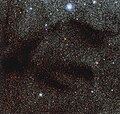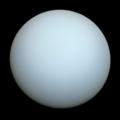Planetary migration occurs when a planet or other body in orbit around a star interacts with a disk of gas or planetesimals, resulting in the alteration...
40 KB (5,112 words) - 22:54, 19 December 2024
halting near its current orbit at 5.2 AU. The reversal of Jupiter's planetary migration is likened to the path of a sailboat changing directions (tacking)...
45 KB (5,403 words) - 04:33, 25 March 2025
giant very close to the star have been found. Theories, such as planetary migration or scattering, have been proposed for the formation of large planets...
51 KB (5,786 words) - 20:44, 17 May 2025
Nebular hypothesis (redirect from Planetary formation)
the migration of planetary embryos followed by collisions and mergers, or the radial drift of small solids from farther out in the disk. The migration of...
75 KB (9,180 words) - 01:06, 29 December 2024
System due to gravitational interactions during the chaotic phase of planetary migration, approximately 4 billion years ago. The Nice model, developed in...
7 KB (717 words) - 16:38, 1 June 2025
Gravitational capture (redirect from Planetary capture)
hypothesized Planet Nine in the Solar System. (Planetary migration is a competing explanation.) Planetary capture (possibly planet swapping with neighboring...
3 KB (342 words) - 15:26, 6 April 2025
physical chemistry and materials Planetary migration, the alteration of the satellite's orbital parameters Migration (virtualization), the process by...
4 KB (473 words) - 18:21, 19 May 2025
Formation and evolution of the Solar System (category Planetary science)
might have shifted due to gravitational interactions. The process of planetary migration explains parts of the Solar System's current structure. In roughly...
113 KB (13,512 words) - 03:13, 5 June 2025
Martyn Fogg (section Planetary migration)
giant planet migration in 2008. Fogg lives in London. Fogg's scientific work started in 1985, with work on simulating extrasolar planetary systems. Starting...
6 KB (560 words) - 16:48, 30 January 2025
differs from earlier models of the Solar System's formation. This planetary migration is used in dynamical simulations of the Solar System to explain historical...
47 KB (5,838 words) - 13:05, 29 May 2025
Jupiter (section Planetary rings)
Bitsch, B.; Mustill, A.J.; Turrini, D. (March 2019). "Consequences of planetary migration on the minor bodies of the early solar system". Astronomy & Astrophysics...
172 KB (16,474 words) - 05:27, 30 May 2025
Lists of planets (redirect from List of planetary bodies)
exoplanets. As of 5 June 2025, there are 5,917 confirmed exoplanets in 4,413 planetary systems, with 994 systems having more than one planet. Most of these were...
9 KB (813 words) - 17:27, 15 May 2025
object Theoretical concepts Accretion Initial mass function Jeans instability Kelvin–Helmholtz mechanism Nebular hypothesis Planetary migration v t e...
10 KB (1,217 words) - 03:26, 24 May 2025
Simulations indicate that this system of resonances must have formed via planetary migration. Kepler-80 d, e, b, c and g have periods in a ~ 1.000: 1.512: 2.296:...
98 KB (10,356 words) - 19:27, 6 June 2025
trojans to be captured when the planetary migration continues. For high-inclination trojans to be captured the migration must have been slow, or their inclinations...
32 KB (2,315 words) - 19:12, 15 January 2025
object Theoretical concepts Accretion Initial mass function Jeans instability Kelvin–Helmholtz mechanism Nebular hypothesis Planetary migration v t e...
7 KB (1,185 words) - 13:56, 1 May 2025
object Theoretical concepts Accretion Initial mass function Jeans instability Kelvin–Helmholtz mechanism Nebular hypothesis Planetary migration v t e...
4 KB (392 words) - 00:41, 3 June 2025
(1920s), an American record company of the 1920s Homestead, fictional planetary migration company, Passengers Homestead (film), a 2024 American post-apocalyptic...
4 KB (527 words) - 10:19, 3 June 2025
called protoplanetary discs because they are probably the progenitors of planetary systems like the Solar System. Circumstellar discs are estimated to dissipate...
8 KB (901 words) - 02:38, 21 March 2025
multi-resonant planetary system. As the eccentricities of the planetesimals are excited by gravitational encounters with Pluto-mass objects, an inward migration of...
103 KB (13,560 words) - 00:46, 5 January 2025
Bitsch, B.; Mustill, A. J.; Turrini, D. (2019). "Consequences of planetary migration on the minor bodies of the early solar system". Astronomy & Astrophysics...
40 KB (4,588 words) - 09:05, 27 October 2024
nebular gas, never reached that critical point. Recent simulations of planetary migration have suggested that both ice giants formed closer to the Sun than...
159 KB (15,670 words) - 01:25, 5 June 2025
object Theoretical concepts Accretion Initial mass function Jeans instability Kelvin–Helmholtz mechanism Nebular hypothesis Planetary migration v t e...
33 KB (3,752 words) - 14:09, 24 May 2025
object Theoretical concepts Accretion Initial mass function Jeans instability Kelvin–Helmholtz mechanism Nebular hypothesis Planetary migration v t e...
9 KB (844 words) - 21:05, 15 March 2025
dynamics result in some effects which are unidirectional (for example, planetary migration). Secular phenomena create variations in the orbits of the Moon and...
10 KB (1,118 words) - 18:45, 25 October 2024
object Theoretical concepts Accretion Initial mass function Jeans instability Kelvin–Helmholtz mechanism Nebular hypothesis Planetary migration v t e...
18 KB (2,881 words) - 23:01, 24 May 2025
object Theoretical concepts Accretion Initial mass function Jeans instability Kelvin–Helmholtz mechanism Nebular hypothesis Planetary migration v t e...
4 KB (481 words) - 02:20, 30 August 2024
51 Pegasi (category Planetary systems with one confirmed planet)
with theories of planet formation and resulted in discussions of planetary migration. However, several hot Jupiters are now known to be oblique relative...
23 KB (1,828 words) - 22:14, 5 June 2025
object Theoretical concepts Accretion Initial mass function Jeans instability Kelvin–Helmholtz mechanism Nebular hypothesis Planetary migration v t e...
5 KB (615 words) - 20:25, 8 January 2025
Solar System belts (category Planetary science)
migrate far from the star. In both types of migrations, the Solar System belts are lost in these planetary migrations. The Grand tack hypothesis explains how...
13 KB (1,142 words) - 17:10, 19 March 2025














